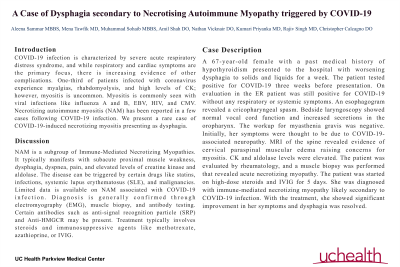Sunday Poster Session
Category: Esophagus
P0607 - A Case of Dysphagia Secondary to Necrotising Autoimmune Myopathy Triggered by COVID-19
Sunday, October 27, 2024
3:30 PM - 7:00 PM ET
Location: Exhibit Hall E

Has Audio

Aleena Sammar, MBBS
Parkview Medical Center
Pueblo, CO
Presenting Author(s)
Award: Presidential Poster Award
Aleena Sammar, MBBS, Mena Tawfik, MD, Muhammad Sohaib, MD, Amil Shah, DO, Nathan Vicknair, DO, Kumari Priyanka, MD, Rajiv Singh, MD, Christopher Calcagno, DO, PharmD
Parkview Medical Center, Pueblo, CO
Introduction: COVID-19 infection is characterized by severe acute respiratory distress syndrome, and while respiratory and cardiac symptoms are the primary focus, there is increasing evidence of other complications. One-third of patients infected with coronavirus experience myalgias, rhabdomyolysis, and high levels of CK; however, myositis is uncommon. Myositis is commonly seen with viral infections like influenza A and B, EBV, HIV, and CMV. Necrotizing autoimmune myositis (NAM) has been reported in a few cases following COVID-19 infection. We present a rare case of COVID-19-induced necrotizing myositis presenting as dysphagia.
Case Description/Methods: A 67-year-old female with a past medical history of hypothyroidism presented to the hospital with worsening dysphagia to solids and liquids for a week. The patient tested positive for COVID-19 three weeks before presentation. On evaluation in the ER patient was still positive for COVID-19 without any respiratory or systemic symptoms. An esophagogram revealed a cricopharyngeal spasm. Bedside laryngoscopy showed normal vocal cord function and increased secretions in the oropharynx. The workup for myasthenia gravis was negative. Initially, her symptoms were thought to be due to COVID- 19- associated neuropathy. MRI of the spine revealed evidence of cervical paraspinal muscular edema raising concerns for myositis. CK and aldolase levels were elevated. The patient was evaluated by rheumatology, and a muscle biopsy was performed that revealed acute necrotizing myopathy. The patient was started on high- dose steroids and IVIG for 5 days. She was diagnosed with immune-mediated necrotizing myopathy likely secondary to COVID-19 infection. With the treatment, she showed significant improvement in her symptoms and dysphagia was resolved.
Discussion: NAM is a subgroup of Immune-Mediated Necrotizing Myopathies. It typically manifests with subacute proximal muscle weakness, dysphagia, dyspnea, pain and elevated levels of creatine kinase and aldolase. The disease can be triggered by factors such as certain drugs like statins, infections, systemic lupus erythematosus (SLE), and malignancies. Limited data is available on NAM associated with COVID-19 infection. Diagnosis is generally confirmed through electromyography (EMG), muscle biopsy, and antibody testing. Certain antibodies such as anti-signal recognition particle (SRP) and Anti-HMGCR may be present. Treatment typically involves steroids and immunosuppressive agents like methotrexate, azathioprine, or IVIG.
Disclosures:
Aleena Sammar, MBBS, Mena Tawfik, MD, Muhammad Sohaib, MD, Amil Shah, DO, Nathan Vicknair, DO, Kumari Priyanka, MD, Rajiv Singh, MD, Christopher Calcagno, DO, PharmD. P0607 - A Case of Dysphagia Secondary to Necrotising Autoimmune Myopathy Triggered by COVID-19, ACG 2024 Annual Scientific Meeting Abstracts. Philadelphia, PA: American College of Gastroenterology.
Aleena Sammar, MBBS, Mena Tawfik, MD, Muhammad Sohaib, MD, Amil Shah, DO, Nathan Vicknair, DO, Kumari Priyanka, MD, Rajiv Singh, MD, Christopher Calcagno, DO, PharmD
Parkview Medical Center, Pueblo, CO
Introduction: COVID-19 infection is characterized by severe acute respiratory distress syndrome, and while respiratory and cardiac symptoms are the primary focus, there is increasing evidence of other complications. One-third of patients infected with coronavirus experience myalgias, rhabdomyolysis, and high levels of CK; however, myositis is uncommon. Myositis is commonly seen with viral infections like influenza A and B, EBV, HIV, and CMV. Necrotizing autoimmune myositis (NAM) has been reported in a few cases following COVID-19 infection. We present a rare case of COVID-19-induced necrotizing myositis presenting as dysphagia.
Case Description/Methods: A 67-year-old female with a past medical history of hypothyroidism presented to the hospital with worsening dysphagia to solids and liquids for a week. The patient tested positive for COVID-19 three weeks before presentation. On evaluation in the ER patient was still positive for COVID-19 without any respiratory or systemic symptoms. An esophagogram revealed a cricopharyngeal spasm. Bedside laryngoscopy showed normal vocal cord function and increased secretions in the oropharynx. The workup for myasthenia gravis was negative. Initially, her symptoms were thought to be due to COVID- 19- associated neuropathy. MRI of the spine revealed evidence of cervical paraspinal muscular edema raising concerns for myositis. CK and aldolase levels were elevated. The patient was evaluated by rheumatology, and a muscle biopsy was performed that revealed acute necrotizing myopathy. The patient was started on high- dose steroids and IVIG for 5 days. She was diagnosed with immune-mediated necrotizing myopathy likely secondary to COVID-19 infection. With the treatment, she showed significant improvement in her symptoms and dysphagia was resolved.
Discussion: NAM is a subgroup of Immune-Mediated Necrotizing Myopathies. It typically manifests with subacute proximal muscle weakness, dysphagia, dyspnea, pain and elevated levels of creatine kinase and aldolase. The disease can be triggered by factors such as certain drugs like statins, infections, systemic lupus erythematosus (SLE), and malignancies. Limited data is available on NAM associated with COVID-19 infection. Diagnosis is generally confirmed through electromyography (EMG), muscle biopsy, and antibody testing. Certain antibodies such as anti-signal recognition particle (SRP) and Anti-HMGCR may be present. Treatment typically involves steroids and immunosuppressive agents like methotrexate, azathioprine, or IVIG.
Disclosures:
Aleena Sammar indicated no relevant financial relationships.
Mena Tawfik indicated no relevant financial relationships.
Muhammad Sohaib indicated no relevant financial relationships.
Amil Shah indicated no relevant financial relationships.
Nathan Vicknair indicated no relevant financial relationships.
Kumari Priyanka indicated no relevant financial relationships.
Rajiv Singh indicated no relevant financial relationships.
Christopher Calcagno indicated no relevant financial relationships.
Aleena Sammar, MBBS, Mena Tawfik, MD, Muhammad Sohaib, MD, Amil Shah, DO, Nathan Vicknair, DO, Kumari Priyanka, MD, Rajiv Singh, MD, Christopher Calcagno, DO, PharmD. P0607 - A Case of Dysphagia Secondary to Necrotising Autoimmune Myopathy Triggered by COVID-19, ACG 2024 Annual Scientific Meeting Abstracts. Philadelphia, PA: American College of Gastroenterology.

